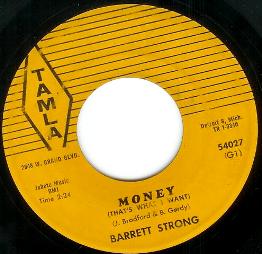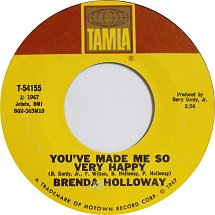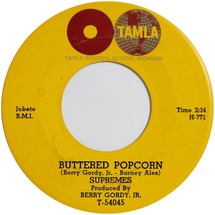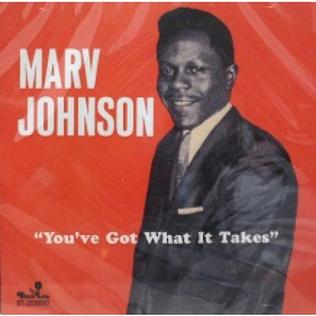Motown is an American record label owned by the Universal Music Group. It was founded by Berry Gordy Jr. as Tamla Records on January 12, 1959, and incorporated as Motown Record Corporation on April 14, 1960. Its name, a portmanteau of motor and town, has become a nickname for Detroit, where the label was originally headquartered.

Berry Gordy III, also known as Berry Gordy Jr., is an American retired record executive, record producer, songwriter, film and television producer. He is best known as the founder of the Motown record label and its subsidiaries, which was the highest-earning African-American business for decades.

"Money (That's What I Want)" is a rhythm and blues song written by Tamla founder Berry Gordy and Janie Bradford, which was the first hit record for Gordy's Motown enterprise. Barrett Strong recorded it in 1959 as a single for the Tamla label, distributed nationally on Anna Records. Many artists later recorded the tune, including the Beatles in 1963 and the Flying Lizards in 1979.
Mable John was an American blues vocalist and was the first female artist signed by Berry Gordy to Motown's Tamla label.

The Soulful Moods of Marvin Gaye is the debut studio album by Marvin Gaye, released in 1961, and the second long-playing album (TM-221) released by Motown. The first was Hi... We're the Miracles (TM-220). It is most notable as the album that caused the first known struggle of Gaye's turbulent tenure with the label.

That Stubborn Kinda Fellow is the second studio album by Marvin Gaye, released on the Tamla label in 1963. The second LP Gaye released on the label, it also produced his first batch of successful singles for the label and established Gaye as one of the label's first hit-making acts in its early years.

"Shop Around" is a song originally recorded by the Miracles on Motown Records' Tamla subsidiary label. It was written by Miracles lead singer Smokey Robinson and Motown Records founder Berry Gordy. It became a smash hit in 1960 when originally recorded by the Miracles, reaching number one on the Billboard R&B chart, number one on the Cashbox Top 100 Pop Chart, and number two on the Billboard Hot 100 chart. It was the Miracles' first million-selling hit record, and the first-million-selling hit for the Motown Record Corporation.

Marvin Earl Johnson was an American R&B singer, songwriter and pianist. He was influential in the development of the Motown style of music, primarily for the song "Come to Me," which was the first record issued by Tamla Records, the precursor to the famous label.

Hi... We're the Miracles is the first album by the Miracles, Motown's first group, released on Motown's Tamla subsidiary label in January 1961. It was the first album released by the Motown Record Corporation. The album features several songs that played an important role in defining The Motown Sound and establishing songwriters Smokey Robinson and Berry Gordy.

Greatest Hits from the Beginning is a compilation double LP by the Miracles released in 1965. This was the first double album ever released by the Motown Record Corporation. It covers most of the group's hits from their pre-1965 albums, such as "Shop Around", "Who's Lovin’ You", "You've Really Got A Hold On Me" and "Mickey's Monkey", as well as the non-album singles from 1964: "I Like It Like That" and "That's What Love Is Made Of". The album was a success, reaching #21 on the Billboard Pop Album Chart. It was also the first Miracles album to chart on the Billboard R&B Album chart, where it was an even bigger success, peaking at #2.

"More Love" is a 1967 hit single recorded by the American soul group The Miracles for Motown Records' Tamla label. The single, included on the group's 1967 album Make It Happen, later reissued in 1970 as The Tears of a Clown. Kim Carnes's 1980 cover of the song reached the Top 10 of Billboard's Adult Contemporary and Hot 100 charts.
"Bye Bye Baby" is the first single by R&B singer Mary Wells, released in September 1960 on the Motown label. The song was one of Motown's earliest hit singles and showcased a much rougher vocal than the singer had during her later years.

"You've Made Me So Very Happy" is a song written by Brenda Holloway, Patrice Holloway, Frank Wilson and Berry Gordy, and was released first as a single in 1967 by Brenda Holloway on the Tamla label. The song was later a huge hit for jazz-rock band Blood, Sweat & Tears in 1969, and became a Gold record.

"Buttered Popcorn" is a 1961 song written by Motown executives Berry Gordy and Barney Ales, produced by Gordy, and released as a Tamla label single by Motown singing group The Supremes. It was the group's second single after signing with Motown Records as well as their second, and last, single for the Tamla label, before moving to the Motown label.
"Way Over There" is a 1960 Motown soul song and single, written by William "Smokey" Robinson, produced by Berry Gordy, and first performed by the Miracles for the Tamla (Motown) label. It was one of The Miracles' earliest charting singles, reaching #94 on the Billboard Pop chart. Motown president Berry Gordy, Jr. had The Miracles record the song several times during its chart run. The first version had minimal orchestration. The second version added strings, and this is the version played by most oldies stations today. Claudette Robinson had several lead parts on this song, answering Smokey's leads with chants of "Come to me, Baby". The song's B-side, "(You Can) Depend on Me", while not charting nationally, did become a popular regional hit in many areas of the country, and Smokey still sings it in his live shows today. "Way Over There" was subsequently recorded by Edwin Starr, The Temptations, The Marvelettes, The Royal Counts, The Spitballs, and Eddie Adams Jr, while "(You Can) Depend on Me" was later recorded by The Temptations, The Supremes, Mary Wells, and Brenda Holloway. The song was also used for the title of Hip-O Select's 2009 compilation: The Miracles – Depend on Me: The Early Albums, which collects the first five LP releases by the group.
"Bad Girl" is a 1959 doo-wop single by The Miracles. Issued locally on the Motown Records label, it was licensed to and issued nationally by Chess Records because the fledgling Motown Record Corporation did not, at that time, have national distribution. It was the first single released on the Motown label – all previous singles from the company were released on Motown's Tamla label. Although The Miracles had charted regionally and on the R&B charts with several earlier songs, including "Got a Job", "I Cry", "I Need a Change", and "(You Can) Depend on Me", "Bad Girl" was their first national chart hit, reaching #93 on the Billboard Hot 100. Written by Miracles lead singer Smokey Robinson and Motown Records' President and Founder Berry Gordy, "Bad Girl" is a sad, remorseful ballad about a young woman, whom Robinson, as the narrator, says "was so good at the start", but who later in the song "is breaking my heart". It is in the popular doo-wop style, as several of The Miracles' songs were during the late 1950s. The record's success, coupled with the distributor's failure to pay Gordy and The Miracles properly for its sales, prompted Robinson to urge Gordy to "go national" with it, meaning that Motown should do its own national distribution of its songs, and eliminate the middleman, to ensure that all money from sales of its records would go directly to the label.
"Let Your Conscience Be Your Guide" is the debuting single for singer Marvin Gaye, released as Tamla 54041, in May 1961. It was also the first release off Gaye's debut album, The Soulful Moods of Marvin Gaye, in which most of the material was the singer's failed attempt at making an 'adult' record compared to Motown's younger R&B sound.
The Gordys are an African-American family of businesspeople and music industry executives. They were born to Georgia-reared parents Berry "Pops" Gordy Sr. and Bertha Gordy and raised in Detroit, where most of the siblings played a pivotal role in the international acceptance of rhythm and blues music as a crossover phenomenon in the 1960s. The accomplishment is attributable to the creation of Motown, a company founded by the seventh-oldest sibling, Berry Gordy Jr..

"You Got What It Takes" is a 1959 single by Marv Johnson. In the US it reached number 2 on the Black Singles chart, and number 10 on the Billboard Hot 100 early in 1960. In the UK Singles Chart it reached a high of number 7. The original recording of "You Got What It Takes" was by Bobby Parker on Vee-Jay 279 in 1958. Parker claims to have written the song, and his name is on the 1958 recording, but later versions credit Berry Gordy, Gwen Gordy, Billy Davis, and sometimes Marv Johnson.

Please Mr. Postman is the 1961 studio debut album from Motown girl group The Marvelettes and the sixth album ever released by the company. The focal track is the number-one hit single, "Please Mr. Postman". The album notably features cover versions of label mates The Miracles' "Way Over There" and "I Want a Guy", which was the debut single for fellow Motown girl group The Supremes the same year, and their cover had served as the b-side to "Twistin' Postman" the less successful follow-up to "Please Mr. Postman." Although the original version by The Supremes flopped, The Marvelettes' cover became a regional hit.












